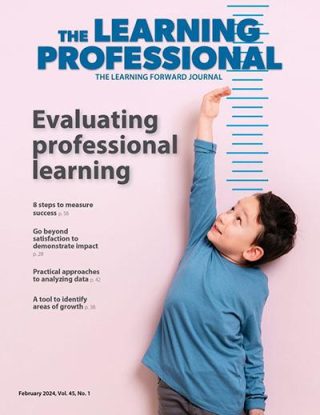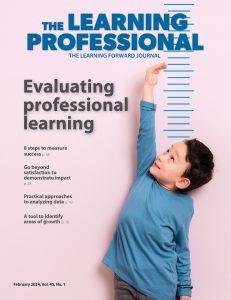DALLAS—August 22, 2014—Like so many other educators, I am studying the recent poll results about public and educator opinions about Common Core State Standards, particularly from PDK International and Education Next, with great interest and concern. Learning Forward has consistently held the view that rigorous learning standards for students have significant potential to increase students’ equal access to engaging and meaningful learning experiences. Therefore, Learning Forward strongly supports Common Core standards and is eager to see their effective implementation in states across the nation.
We believe the same about learning standards for the adults who work in schools. Our own Standards for Professional Learning were created in part to ensure that every educator in every school and system in the U.S. and beyond experiences the kind of professional learning that leads to better teaching practices and improved student results.
When I read about some of the shifts in public and teacher support for the Common Core standards, I am concerned. I know there are many teachers who have had powerful professional learning to support them with implementation of the standards. On the other hand, there are others who have not experienced professional learning that enables them to develop confidence in the standards or the expertise to address them in the classroom. All teachers, as well as school leaders and district administrators, need time, resources, and support to continue to increase their knowledge and skills. The new standards call for new ways of teaching, and learning to do that doesn’t happen overnight.
The Department of Education’s newly announced delay in linking results from new student assessments to teacher evaluations will also help districts to advance implementation of these multiple initiatives. Extra time gives educators the opportunity to focus on the standards, reduce the fears often associated with changing behaviors, and determine which new practices are most helpful to their students’ success. School districts have the opportunity to get implementation right.
I urge school and system leaders to take the following actions to support their teachers and communities in holding high expectations and creating the learning experiences that make achieving those expectations possible:
- Simply and clearly articulate your vision for how rigorous content standards can lead to the outcomes we want for our children – valuable classroom learning, development of knowledge and skills for tomorrow’s challenges, and readiness for careers and college. Share this vision widely with teachers, staff, students, parents, local businesses, and community members.
- Accelerate achievement of this vision with learning opportunities that are relevant for the adult learners in your district, and as appropriate, include parents. Some learners still require additional opportunities to understand the standards. Other learners are ready for deeper engagement in how the standards impact classroom instruction and what it takes to transform teaching practice.
- Create the learning structures, arrange the schedules, and provide the job-embedded support teachers need to deliberately and successfully translate the Common Core State Standards into practice. Give teachers time in their work weeks to collaborate, unpack standards, understand curriculum, research teaching strategies, examine data, practice instructional moves, and refine lessons. Give them access to skilled colleagues, teacher leaders, or instructional coaches to facilitate this learning work and offer usable feedback.
- Align district, school, and individual goals. When districts are implementing multiple initiatives, aligned support and professional learning foster the achievement of common goals. Help everyone in the system to understand shared priorities. Ensure that the desired outcomes for individuals, teams, grade levels, and content area departments are coherent. Consider how teachers with different levels of knowledge, experience, and skills need a range of supports.
I am optimistic about what our teachers, administrators, schools, and districts will accomplish for our students in the coming years, and of the role that the Common Core State Standards will have as we make progress in teaching and learning. I have confidence that school systems that combine their commitment to the standards with the support required to realize them will achieve outcomes that have been unattainable in the past.







